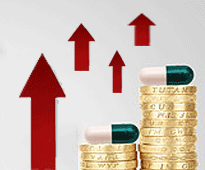fiercepharmaMarch 26, 2019
Tag: Humalog , Lilly , Insulin
Eli Lilly is under the gun for insulin price hikes, facing lawsuits, congressional scrutiny and general public outcry. But the drugmaker has repeatedly said it's not profiting off those increases, and in its new annual report, it offers up some stats to bolster that case.

That report (PDF) acknowledges that Lilly's Humalog list prices grew 52% over five years. But thanks to payer hardball—and the discounts and rebates it's had to offer to gain formulary access—net prices fell 8% over the same timeframe, the company said.
It's among the few data points Big Pharma has offered up on an individual brand; most drugmakers are releasing "pricing transparency" reports that divulge average price increases—gross and net—across their entire portfolios. Lilly released its own stats on that in the annual report, too, citing an increase in list prices of 5.5% in the U.S. last year. Net prices after discounts and rebates, however, dropped by 0.5%, the company said.
Lilly said its average U.S. net prices fell 13 percentage points from 2014 to 2018. In 2014, the company captured an average of 59% of its list prices; the figure fell to 46% last year, the company said.
The numbers are the latest in an ongoing debate over drug pricing and rebates. For years, rebates to middlemen have grown, as have pharma's list prices. At the same time, insurance companies have shifted more members to high deductible plans, forcing patients to pay more to get their drugs.
In its annual report, Lilly said more competition, tougher negotiations by pharmacy benefit managers and other factors have contributed to the increase in rebates. PBMs argue that their negotiations save health systems billions of dollars annually in drug costs.
Lilly's disclosure comes in the same month that the company said it would roll out an authorized generic to its blockbuster Humalog at a 50% discount to the brand. The company said the authorized generic route is quicker and easier than a list price reduction to reduce patient costs. Humalog is still available for patients accessing it through their insurance.
Patient advocates have railed on insulin pricing for years, and even after Lilly's decision to roll out a copycat, some weren’t happy. The group Patients For Affordable Drugs tweeted that Humalog’s price has grown more than 1,200% since 1996 and will still be too expensive after the discount. Lilly is among a group of companies that have faced investigations and lawsuits over insulin pricing.
Lilly isn’t the first company to roll out pricing information amid an ongoing debate in the industry over rebates. Last month, Sanofi disclosed that even after 35 price hikes, its net prices fell 8% on average last year. Johnson & Johnson and Merck are among other companies that have rolled out similar reports on pricing.
Amid the pricing debate, the HHS recently proposed removing rebates from public insurance plans. Under the proposal, "safe harbor" protections would apply to discounts for patients instead of rebates, and PBMs could charge fees for their services rather than keeping a percentage of rebates.
HHS Secretary Alex Azar said Congress should expand the idea to commercial markets. Pharma companies have lauded the idea, while PBMs have pushed back.
Register as Visitor to CPhI China 2019!

-----------------------------------------------------------------------
Editor's Note:
To apply for becoming a contributor of En-CPhI.cn,
welcome to send your CV and sample works to us,
Email: Julia.Zhang@ubmsinoexpo.com.


Contact Us
Tel: (+86) 400 610 1188
WhatsApp/Telegram/Wechat: +86 13621645194
Follow Us:




 Pharma Sources Insight January 2025
Pharma Sources Insight January 2025


